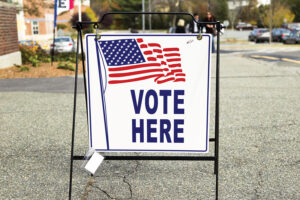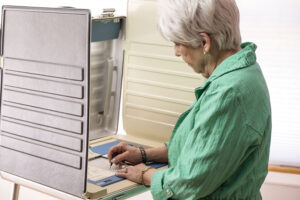Election season is in full swing. Some of it can drive you crazy – the commercials, the robo calls, etc. But as candidates head out to engage voters in their communities, it’s vital they know that millions of electric cooperative members will cast their ballots in 2016. That means you need to register to vote, understand the issues, and then vote. Let’s remember that a lot of good men and women fought and died to protect our freedom and right to vote. It’s the least we can do to exercise that right.
To that end, America’s electric cooperatives have launched Co-ops Vote, a program dedicated to informing, engaging, and educating co-op voters across the nation. You can join this non-partisan effort today by taking the pledge by first registering to vote if you haven’t, and then showing up at the polls to vote. Visit www.vote.coop to take the pledge now.
At www.vote.coop, you can find out how to register to vote, prepare for key voting dates and locations, learn more about issues affecting rural America and take the pledge to become a co-op voter.
When was the last time you voted?
 As member-owned electric cooperatives, voting is already in our DNA. It’s how we maintain an electric utility that is responsive to the consumers it serves. But voting also plays a crucial part in our representative democracy.
As member-owned electric cooperatives, voting is already in our DNA. It’s how we maintain an electric utility that is responsive to the consumers it serves. But voting also plays a crucial part in our representative democracy.
Yet in places all over America, too many citizens aren’t exercising that right. In the 2012 national elections, voter turnout dropped overall, but the decline in rural counties was 18 percent — twice that of the nation as a whole.
Jeffrey Connor, National Rural Electric Cooperative Association (NRECA) Interim CEO says, “We’re investing in Co-ops Vote to build a strong, new model of civic engagement to match the change in our political systems. At some point, our national politics will recover. Electric cooperatives will be there when that happens. We will help make it happen. Elections matter. They belong to the people, but they’re about ideas. With our full participation and the full participation of our neighbors, we can guarantee that those ideas come from us.”
We used to say, “all politics is local.” But today’s politics often seem disconnected from the reality in our local communities. “You have to be up close and personal with someone to get that sense of what’s in their heart,” says Connor. “But that’s hard to do, and in national elections at the end of this grueling process, less than half of eligible voters actually show up to vote.”
Washington has lost people’s trust, he adds. “We can’t count on political institutions to deliver the progress we need in our communities. But we can count on electric cooperatives. We can make politics ‘local’ again. We can demonstrate our concern for community through participation in our democracy. We can organize voter registration and drive voter education. That effort involves everyone at your co-op, in your family, at your coffee shop, your church, your book club. Your colleagues at work and your friends at Rotary and the VFW.”
Elections matter
Elections are not just about personalities. Let’s remember they are about key issues where we work and live, making our communities resilient against natural disasters. Co-ops are expanding broadband service and creating economic opportunities for new job creation in rural areas. And for co-ops in particular, it is about being able to continue to provide access to safe, reliable and affordable electricity.
Phil Carson, NRECA Board Vice President, is also a board member for Tri-County Electric Cooperative Association in Mt. Vernon, Ill. He says, “If we do not allow our voice and our vote, which is a powerful message, to be heard and counted, we’ve missed out on making sure our rural issues are addressed. Co-ops Vote gives you the opportunity to understand what tools are available to you — to understand how to register, what district you are in, etc. It will also give you a broad spectrum of issues impacting rural America and educate and inform you on that front.”
Carson says he appreciates that the voter education program is non-partisan. “It is not pro Republican or Democrat. It shows you issues and positions that are pro rural and gives you the tools so you can make an informed choice when you step into the voting booth.”
Rural issues worth voting for
 Reliable electricity, access to rural broadband and the quality of our healthcare system are just a few issues we all care about. Still, they only become political priorities if enough people show elected officials they are paying attention.
Reliable electricity, access to rural broadband and the quality of our healthcare system are just a few issues we all care about. Still, they only become political priorities if enough people show elected officials they are paying attention.
Duane Noland, Association of Illinois Electric Cooperative’s President/CEO, is a former Illinois state senator and he understands the power of voting and involved citizens. He also understands the power of the cooperative principles. “When we go to the polls with the cooperative principle of ‘Concern for Community’ in mind, we instantly improve our political system. It’s a system designed to produce a government ‘of the people, by the people and for the people,’ as Lincoln said.”
One of the large issues for rural America is fresh young leadership and opportunities for our young citizens. Noland points out that in addition to concern for community, cooperatives are concerned for the future of our young people and helping develop young leaders.
Speaking to co-op members who might be the parents or grandparents of these young citizens, Noland says we need to set the right example. “How can we expect the future of rural Illinois to improve if we don’t set the right example for our children and grandchildren, and show them how important it is to be involved citizens,” he says. “If you haven’t registered, do
it today. And come November be sure to vote.”
Visit the Co-ops Vote website, WWW.VOTE.COOP. The website will give you information on your elected officials and candidates, the voter registration process, election dates and locations, and background about eight key co-op issues we want our elected leaders to understand, like rural broadband access, hiring and honoring veterans, low-income energy assistance, cybersecurity, water regulation, rural health care access, affordable and reliable energy, and renewable energy.








